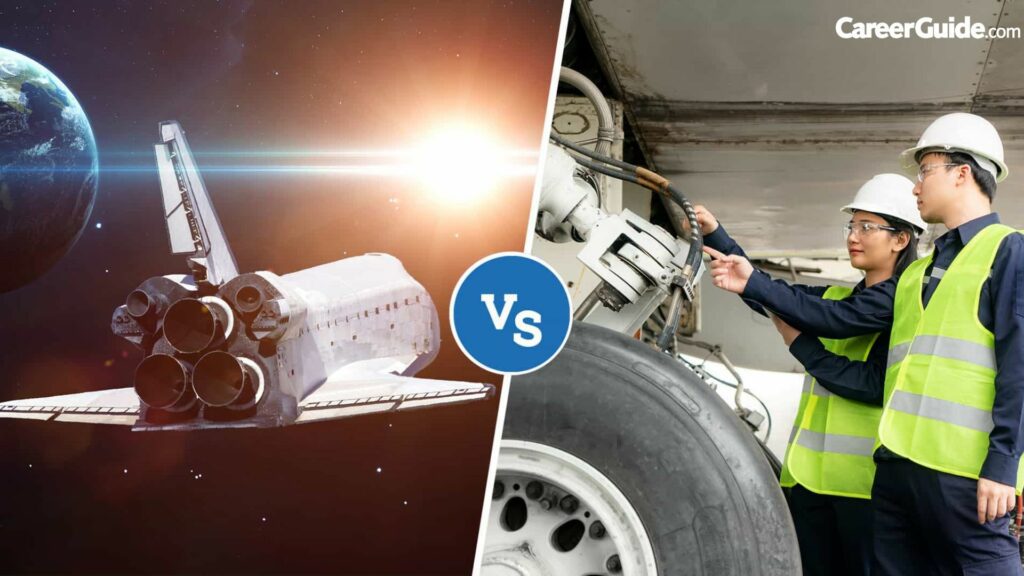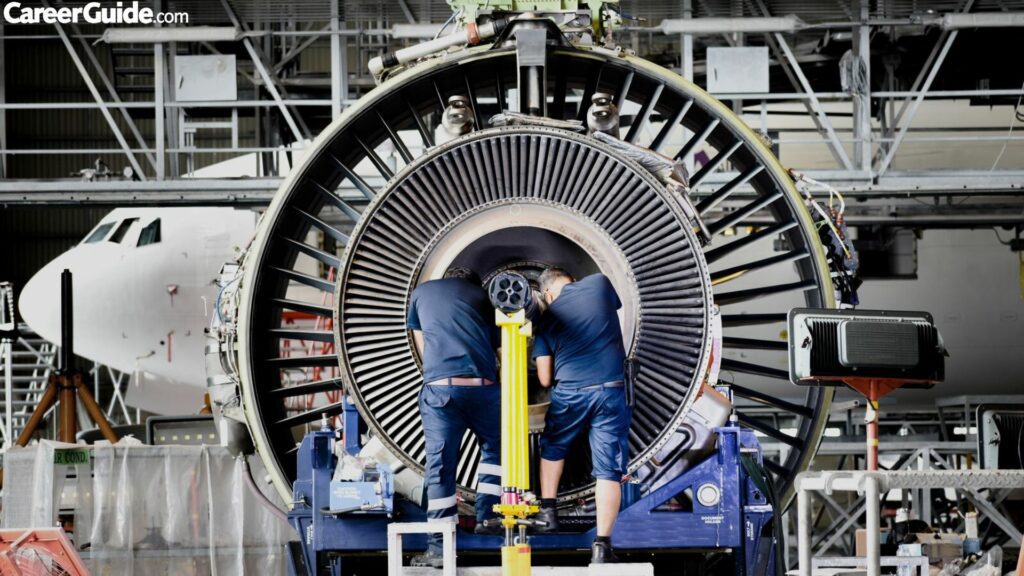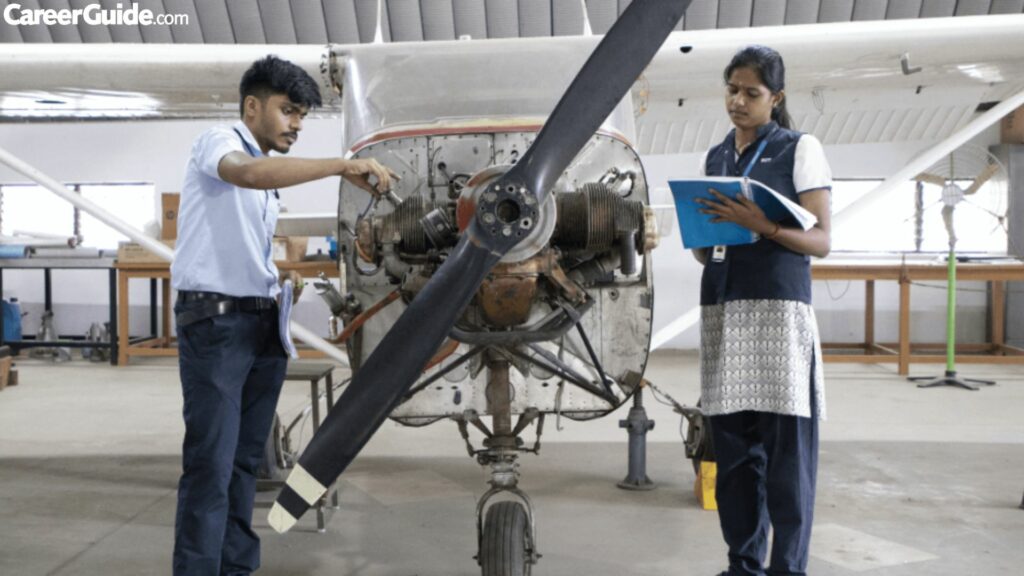Aerospace engineering is a specialized branch of engineering which involves an elaborate study of skills to design, manufacture and maintain spacecraft, aircraft, missiles, and weapon systems. They may develop new technologies which are used in aviation, space crafts, and defense systems. They also create and test prototypes to ensure that they function according to the design. They specialize in fields such as aerodynamic fluid flow; structural design; guidance, navigation, and control; instrumentation and communication; robotics; propulsion, and combustion. They can also specialize in designing different types of aerospace products like commercial and military airplanes and helicopters, aircraft and rotorcraft, spacecraft including launch vehicles and satellites, military missiles, and rockets.
download Universities/colleges cutoff
all about aerospace engineer
ENTRANCE EXAM QUESTIONS
Aerospace engineers are experts in one or more the areas such as aerodynamics, thermodynamics, celestial mechanics, flight mechanics, acoustics, and guidance and control systems. They specialize in one of the two types of engineering, aeronautical or astronautical.
Aeronautical engineers are involved in designing aircraft and propulsion systems and in studying the aerodynamic performance of aircraft and construction materials. They work with the theory, technology, and practice of flight within the Earth’s atmosphere.
NIRF top engineering colleges 2023
Astronautical engineers work with the science and technology of aircraft and how they perform inside and outside the Earth’s atmosphere. It also involves work on small satellites like CubeSats and traditional large satellites.

Although both aerospace and aeronautical engineers deal with different environmental and operational issues in designing aircraft and spacecraft, both these fields overlap each other as they depend on the same basic principles of physics.
If you want to study further in this field, go for a Ph.D. After that, you may get to work at the National Aeronautics and Space Administration (NASA) in the United States (US). If you are good at research, this field has a great scope for you. As an aerospace engineer, you can work both in the government and the private sectors.
ENTRANCE EXAM QUESTIONS
Salary Of An Aerospace Engineer
At the entry-level, an Aerospace engineer can earn from INR 670,000 to 820,000 per annum in companies like Hindustan Aeronautics Limited (HAL) whereas an Aeronautical engineer can earn up to INR 30,00,000 per annum in Defense Research and Development Laboratories (DRDO).
An Aerospace engineer can earn INR 8,00,000 per annum in Civil Aviation Department and an aeronautical engineer can earn INR 5,00,000-6,00,000 per annum in the Indian Space Research Organization (ISRO).
Likewise, Aerospace design checkers can earn INR 3,00,000-6,00,000 per annum in Air India and Aircraft production managers can earn INR 12,00,000 per annum in the Indian Space Research Organization (ISRO). Mechanical design engineers earn INR 7,30,000 per annum in companies like Tata Advanced Systems.
How To Be An Aerospace Engineer- Eligibility Criteria

You can become an Aerospace engineer by enrolling yourself in a graduate program offered by many colleges. For this, you should have an overall minimum aggregate of 60% in the Science stream (PCM) in the 12th class from a recognized institute or Board. The diploma holders in a relevant discipline or equivalent can also apply for the same. Admissions are offered on both merit basis or the basis of entrance tests. The entrance exams can be national level, state level, and institute level. JEE Mains, MHT CET, KCET, CUCET, And TNEA are a few top entrance exams. B.Tech in Aerospace is a 4-year program.
NIRF top engineering colleges 2023
A few top institutes in India which offer a degree in Aerospace engineering are:
Some colleges and universities offer cooperative programs in collaboration with regional businesses, which give students practical experience while completing their education. Cooperative programs and internships give the students valuable experience and also help them finance their education.
In some universities, a student can enroll in a five-year program that includes both a bachelor’s degree and a master’s degree. A graduate degree will allow an engineer to work as an instructor at a university or to do research and development.
Fees Of The Course
The course fees range between INR 65,000 – INR 4,00,000 per year for the total course duration.
ENTRANCE EXAM QUESTIONS
Skills Required By An Aerospace Engineer
An Aerospace engineer should be able to identify design elements that may not meet the requirements and must formulate alternatives to improve the performance of those elements.
The work done by an Aerospace engineer should meet the federal government standards. Knowledge of standard business practices and commercial law is required to meet these standards. Project management or systems engineering skills can be useful.
They should know how to use the principles of calculus, trigonometry, and other advanced topics in maths for analysis, design, and troubleshooting in their work. Aerospace engineers should be able to write papers to explain their designs clearly and to create documentation for future reference.
download Universities/colleges cutoff
Certification, Licence, And Registration Required For Aerospace Engineers

Licensure for aerospace engineers is not required for entry-level positions. For a higher level of leadership and independence, a Professional Engineering (PE) license can be acquired later in one’s career. Licensed engineers are called professional engineers (PEs). A PE can oversee the work of other engineers, sign off on projects and provide services directly to the public. State licensure requires a degree from an ABET-accredited engineering program. Passing score in the Fundamentals of Engineering (FE) exam, work experience of at least 4-years, and passing score in the Professional Engineering (PE) exam. Each state issues its own licenses. Most states recognize licensure from other states.
NIRF top engineering colleges 2023
Benefits And Drawbacks Of Being An Aerospace Engineer
Benefits
- After doing a Ph.D., you may get a chance to work with NASA.
- The salary is good.
- You may explore many things as far as technological development is concerned.
Drawbacks
- You may work in limited companies.
- The projects are mostly run by the government.
- There is a lot of hierarchy in the job pool.






